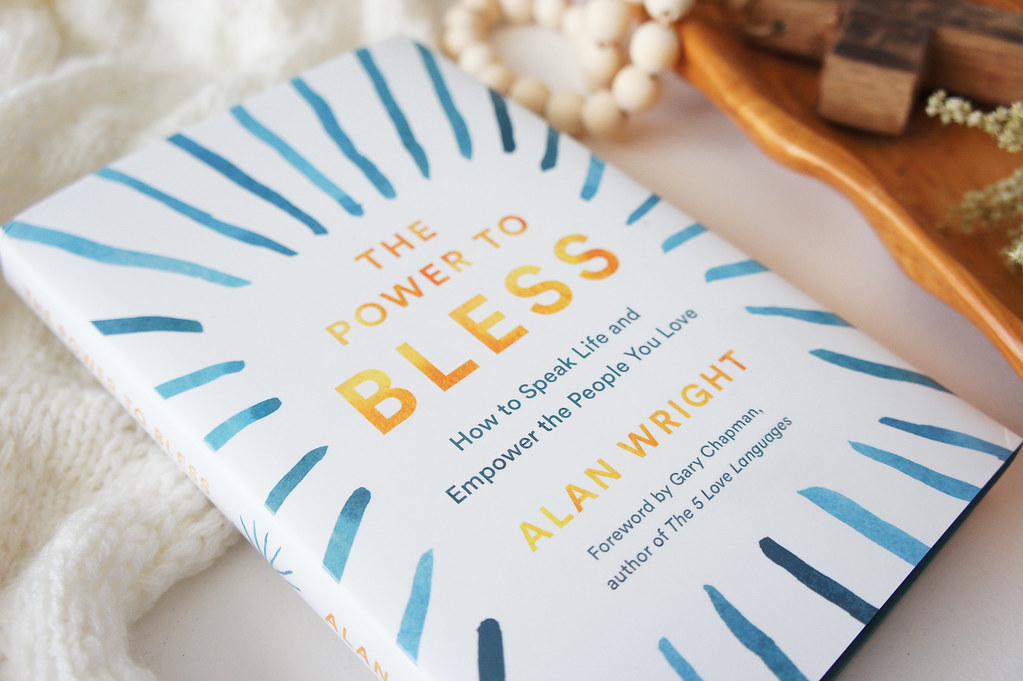Ever feel like something’s holding you back? As if you lack an important key that could change everything? Is there someone you love who seems stuck? You’d like to help them, but how? What’s missing? Maybe it’s blessing that’s missing—a positive, faith-filled vision spoken over our lives. If you’re tired of striving to be better, maybe it’s time to just stop trying so hard and receive a deeper revelation of who you are in Christ. The power of blessing is a golden thread that weaves its way through the whole Bible, but we read and talk about it surprisingly little. In the scripture, blessing is more than a relationship principle—it’s a mystical grace that actually empowers people. I want that power at work in my life and I want to share it with others, don’t you? In his new book, The Power to Bless, Pastor Alan Wright shares his inspiring journey from craving blessing to living the blessed life and shows, step by step, how anyone can learn to bless us others. It’s a grace to welcome Alan to the farm’s front porch today…
S
ome people try hard to succeed so they will feel blessed. Other people try hard to succeed because they already feel blessed. It’s the difference between striving and thriving. It’s the difference between death and life.
For most of my life I was the former: laboring for the blessing I never knew.
Dad had left home when I was in fourth grade, so he wasn’t around to paint a positive vision for my future.
Evidently, he bragged to others about me, but he wasn’t comfortable looking me in the eye, affirming my unique gifts, and pointing me toward a God-given destiny.
So I grew up trying to prove my value as I groped in the dark for my place in the world. Though some unblessed people rebel, I performed in order to feel blessed—make all A’s, obey all the rules, win all the tennis matches.
I was trying to buy blessing, but it was costing me joy and peace.
That’s why Genesis 1:28 is one of the most important verses in the Bible to me. Note well the order of events: “God blessed them. And God said to them, ‘Be fruitful and multiply and fill the earth and subdue it, and have dominion.’” With God, the blessing is not the reward for productivity—it’s the power for it.
The principle of blessing makes your job as a parent, spouse, friend, teacher, employer, or coach simple: just show people who they were made to be.










Does God sometimes put odd things in our lives to teach us important lessons? I guess if He gave Hosea a prostitute wife and sent a worm to eat Jonah’s shade plant, He could give me an immortal tadpole.
The never-changing tadpole actually belonged to my daughter, Abby. When she was five, she came home from her preschool with it. It seemed simple enough—the tadpole was destined to become a frog in front of our eyes. Of course, we needed to dechlorinate the water and change it often.
And, as it turns out, tadpoles are picky eaters. We had to boil spinach, freeze it in ziplock bags, and sprinkle small portions into the tadpole bowl each day. But no worries—in a matter of a few weeks, our spinach-boiling and water-changing duties would be over, and we would have a full-fledged frog that we could release into the wild.
After two weeks, the other preschoolers’ tadpoles had started sprouting legs and dropping tails. But Abby’s didn’t. Her tadpole kept swimming around its bowl and eating frozen spinach. Then two months went by.
My wife Anne bumped into Abby’s preschool teacher, Miss Nikki, at the ten-week mark. “Hey, Nikki, when in the world is the tadpole going to turn into a frog?”
“What are you talking about?” Miss Nikki asked.
“The tadpole you sent home with Abby. When will it grow legs and all that?”
“Uh, that should have happened long ago. Are you saying your tadpole is still a tadpole?”
“Yep—totally tadpole. Zero frog.”
“That’s impossible.”
Another impossible month went by. And another. And another. A year and a half later, Abby’s tadpole was still a tadpole. We were the only family in the history of the world to own an immortal, unchangeable pet tadpole.
One day an older Abby came home from summer camp with an aquatic frog. We were suddenly proud owners of both a tadpole and a frog. We considered placing them in the same bowl, but we were concerned that the unusually large immortal tadpole would eat the smaller though fully developed frog.
So we put the aquatic frog in its own bowl next to the tadpole on the shelf in Abby’s room.
The next day, my seven-year-old daughter called me at the office. “Daddy, Daddy, you won’t believe it!”
“What!”
“My tadpole has grown legs!”
“What? Are you serious? Are you sure you aren’t just looking at your new frog?”
“Daddy, I’m telling you the truth. My tadpole has legs!”
Since it’s part of my job to bear witness to miracles, I packed up and dashed home. Not only did the tadpole have legs, but it also had started losing its tail. By the next day, a full metamorphosis had taken place. Within forty-eight hours of placing a real frog next to its bowl, the immortal tadpole had transformed into a full frog.
Evidently, it just needed to see what it really was.
I think that’s how you and I change—not by trying harder to become something better but by being blessed with a vision of who we are designed to be.
I bet you can think of someone you love who is gifted but who is underachieving because they don’t believe it.
You might know a girl who is lovely and smart, but because she doesn’t feel that way about herself, she keeps dating guys who are the opposite. Perhaps you love someone who is discouraged and depressed because he feels like a failure.
Underachievers don’t start excelling because someone tells them to try harder. Girls don’t pick the right guys because we tell them they ought to be pure. Depressed people don’t get better because we tell them to be happy.
People don’t change until they see themselves differently.
When we spend time telling young frogs how much they still look like tadpoles, they’re likely to stay tadpoles longer. Everyone you meet is, in a sense, both a tadpole and a frog.
The best way to grow as a Christian is to quit listening to your own deceived heart and start listening deeply to what God has to say about who you are:
When you sin, God calls you “holy” (Heb. 10:10 NIV).
When your money runs out, God calls you “rich in every way” (1 Cor. 1:5 NCV).
When you feel ashamed, God calls you “blameless” (Eph. 1:4).
When you’ve done nothing majestic, God calls you a “royal priesthood” (1 Pet. 2:9).
If you feel like a tadpole today, you don’t need to try harder to grow legs—you just need a new vision of your life.
Your metamorphosis will come when you see what God has designed you to be.
Alan Wright is the lead pastor of Reynolda Church in North Carolina, a four-time author, a popular conference speaker, and the host of a daily thirty-minute radio program syndicated on more than four hundred stations, which encourages listeners through the good news of the gospel.
With honesty and warmth, Alan shares his inspiring journey from craving blessing to living the blessed life. The absence of his father’s affirmation left him struggling for years with symptoms of the unblessed life: shame, pretense, and drift. The Power to Bless is a revolutionary book that unveils God’s plan for our transformation. Rather than withholding His blessing until we prove ourselves worthy, God blesses us so we can be productive. Through the lens of the mysterious blessing of Ephraim and Manasseh, the book leads readers into the deepest blessings of God and teaches them how to bless others.
With biblical insight and practical wisdom, The Power to Bless shows you how to craft a positive, faith-filled blessing. By learning a few simple, biblical skills for imparting life-changing blessings, you’ll be more spiritually blessed than you’d ever imagined, and you’ll be equipped with the power to bless the people you love.
[ Our humble thanks to Baker for their partnership in today’s devotion ]








